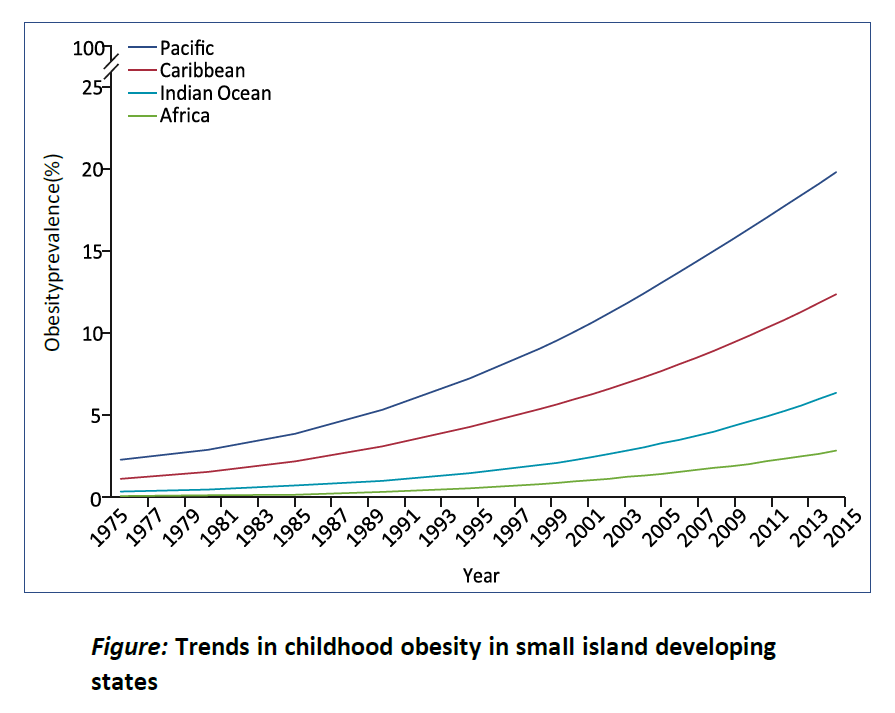COP Program Background
Did You Know That...
Obesity is driven primarily by a poor (calorie dense) diet...and that consumption of sugar-sweetened beverages has been linked to childhood obesity!
Childhood obesity often tracks to adulthood and in the short run, childhood obesity can lead to psycho-social problems and cardiovascular risk factors such as high blood pressure, high cholesterol, and abnormal glucose tolerance or diabetes. Childhood obesity prevalence has increased substantially in the past four decades, from an average of less than 5% in 1980 to 20% in 2015 in Small Island Development States (SIDS).

There is widespread agreement among scientists that the medical costs associated with obesity are substantial and that treating obesity and obesity-related conditions costs billions of dollars a year. In 2005, health-economists estimated that obesity accounts for 21 percent of medical spending estimated at $190 billion.

Facts
|
||
|
||
|
||
|
||
Consequences of Obesity
Due to the rapid increase in obesity prevalence and the serious health consequences, obesity is commonly considered one of the most serious health challenges of the early 21st century.
Lorem Ipsum Lorem Ipsum Lorem Ipsum Lorem Ipsum Lorem Ipsum Lorem Ipsum Lorem Ipsum Lorem Ipsum Lorem Ipsum Lorem Ipsum Lorem Ipsum Lorem Ipsum Lorem Ipsum Lorem Ipsum Lorem Ipsum Lorem Ipsum Lorem Ipsum Lorem Ipsum Lorem Ipsum Lorem Ipsum Lorem Ipsum Lorem Ipsum Lorem Ipsum Lorem Ipsum Lorem Ipsum Lorem Ipsum Lorem Ipsum Lorem Ipsum Lorem Ipsum Lorem Ipsum Lorem Ipsum Lorem Ipsum Lorem Ipsum Lorem Ipsum Lorem Ipsum Lorem Ipsum Lorem Ipsum Lorem Ipsum Lorem Ipsum Lorem Ipsum Lorem Ipsum Lorem Ipsum Lorem Ipsum Lorem Ipsum Lorem Ipsum Lorem Ipsum Lorem Ipsum Lorem Ipsum Lorem Ipsum Lorem Ipsum Lorem Ipsum
Immediate Health Risks
Children who are obese are more likely to develop:
- High blood pressure and high cholesterol, which are risk factors for cardiovascular disease (CVD).
- Increased risk of impaired glucose tolerance, insulin resistance, and type 2 diabetes.
- Breathing problems, such as asthma and sleep apnoea.
- Joint problems and musculoskeletal discomfort.
- Fatty liver disease, gallstones, and gastro-oesophageal reflux (i.e., heartburn).
- Psychological problems such as anxiety and depression.
- Low self-esteem and lower self-reported quality of life.
- Social problems such as bullying and stigma.
Future Health Risks
- CHILDREN who have obesity are more likely to become ADULTS with obesity
- Adult obesity is associated with increased risk of heart disease, type 2 diabetes, and many cancers including, colorectal cancer, kidney cancer and oesophageal cancer
- If CHILDREN are obese, their obesity and disease risk factors in ADULTHOOD are likely to be more severe
- Hypertension, High Cholesterol and Diabetes Mellitus are often referred to as noncommunicable diseases (NCDs); they not only cause premature mortality but also long-term morbidity
- Orthopaedic dysfunction such as osteoarthritis from carrying excess body weight for an extended period of time
- Psycho-social distress, Anxiety and Depression can occur as a result of Childhood obesity and may continue untreated for
Once established, obesity in children (as in adults) is hard to reverse. Monitoring the prevalence of obesity in order to plan services for the provision of care and to assess the impact of policy initiatives is essential.
Rotary in District 7030 recognizes the danger and has come together to tackle this disease head-on!!!